一般将来时用法总结
一般将来时用法小结
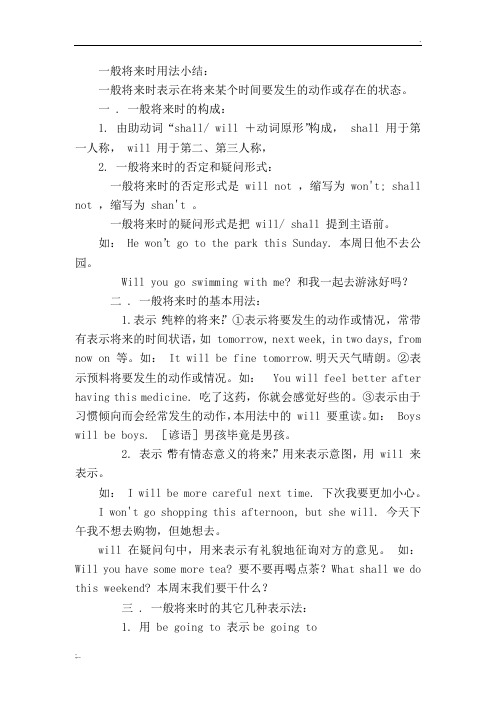
一般将来时用法小结:一般将来时表示在将来某个时间要发生的动作或存在的状态。
一 . 一般将来时的构成:1. 由助动词“ shall/ will +动词原形”构成, shall 用于第一人称, will 用于第二、第三人称,2. 一般将来时的否定和疑问形式:一般将来时的否定形式是 will not ,缩写为 won't; shall not ,缩写为 shan't 。
一般将来时的疑问形式是把 will/ shall 提到主语前。
如: He won’t go to the park this Sunday. 本周日他不去公园。
Will you go swimming with me? 和我一起去游泳好吗?二 . 一般将来时的基本用法:1.表示“纯粹的将来”:①表示将要发生的动作或情况,常带有表示将来的时间状语,如 tomorrow, next week, in two days, from now on 等。
如: It will be fine tomorrow.明天天气晴朗。
②表示预料将要发生的动作或情况。
如:You will feel better after having this medicine. 吃了这药,你就会感觉好些的。
③表示由于习惯倾向而会经常发生的动作,本用法中的 will 要重读。
如: Boys will be boys. [谚语]男孩毕竟是男孩。
2. 表示“带有情态意义的将来”,用来表示意图,用 will 来表示。
如: I will be more careful next time. 下次我要更加小心。
I won't go shopping this afternoon, but she will. 今天下午我不想去购物,但她想去。
will 在疑问句中,用来表示有礼貌地征询对方的意见。
如:Will you have some more tea? 要不要再喝点茶?What shall we do this weekend? 本周末我们要干什么?三 . 一般将来时的其它几种表示法:1. 用 be going to 表示be going to相当于一个助动词,与其后的动词原形一起构成句子的谓语,表示近期将要发生的动作或存在的状态如: I'm going to see a film this afternoon. 今天下午我想去看电影。
一般将来时
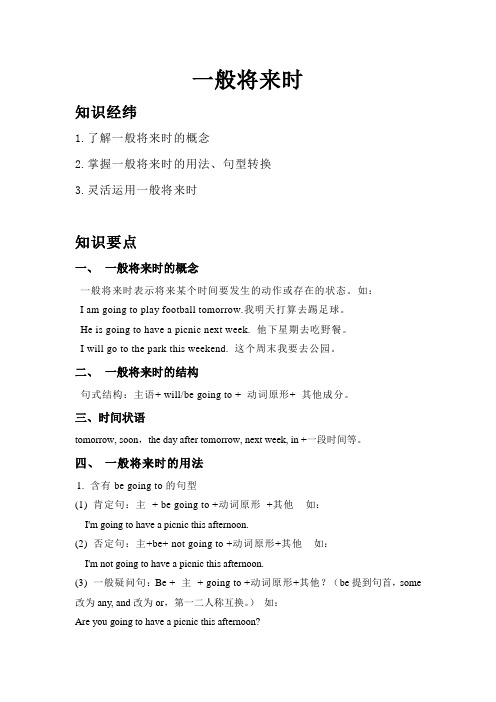
一般将来时知识经纬1.了解一般将来时的概念2.掌握一般将来时的用法、句型转换3.灵活运用一般将来时知识要点一、一般将来时的概念一般将来时表示将来某个时间要发生的动作或存在的状态。
如:I am going to play football tomorrow.我明天打算去踢足球。
He is going to have a picnic next week. 他下星期去吃野餐。
I will go to the park this weekend. 这个周末我要去公园。
二、一般将来时的结构句式结构:主语+ will/be going to + 动词原形+ 其他成分。
三、时间状语tomorrow, soon,the day after tomorrow, next week, in +一段时间等。
四、一般将来时的用法1. 含有be going to的句型(1) 肯定句:主+ be going to +动词原形+其他如:I'm going to have a picnic this afternoon.(2) 否定句:主+be+ not going to +动词原形+其他如:I'm not going to have a picnic this afternoon.(3) 一般疑问句:Be + 主+ going to +动词原形+其他?(be提到句首,some 改为any, and改为or,第一二人称互换。
)如:Are you going to have a picnic this afternoon?肯定回答:Yes, I am.否定回答:No, I’m not.2. 含有will的句型(will可用于所有人称,shall只用于第一人称I和we)( 1 ) 肯定句:主+ will +动词原形+其他如:I will play football tomorrow.(2) 否定句:主+ won’t +动词原形+其他(will后加not成won't)如:I won’t play football tomorrow.(3) 一般疑问句:Will + 主+ +动词原形+其他?(will提到句首,some改为any, and改为or,第一二人称互换) 如:Will you play football tomorrow?肯定回答:Yes, I will.否定回答:No, I won’t.五、一般将来时的特殊疑问句一般情况下,一般将来时的对划线部分有三种情况。
一般将来时的用法

一般将来时一、基本内容1.构成:“助动词will+ 动词原形”2.含义及用法:一般将来时表示将来某个时间将要发生的动作或存在的状态,也表示将来经常或反复发生的动作。
3.时间状语:一般将来时常与表示将来的时间状语连用,如:tomorrow, next week, next year, in the future等。
Eg: They will visit Shanghai next week.People will have robots in their homes in the future.二、句型转化1、肯定句:“主语+will +动词原形+其他。
”Eg: They will have a test next week.2、否定句:在will 后加not ,即“主语+won't +动词原形+其他。
”Eg: She will be an engineer.(改为否定句)She won't be an engineer.3、一般疑问句:将will提到主语前面,即“Will+ 主语+动词原形+其他?”回答时使用yes/no.Eg: He will live in New York in 10 years. (改为一般疑问句并作肯定回答)Will he live in New York in 10 years?Yes, he will.三、注意事项1、Will 常表示客观的将来,也可表示“带意愿色彩的将来”,也可表示“委婉客气的邀请或命令”Eg: He will be 18 years olds next month.下个月他将满18岁。
I will tell you all about it. 我愿意把所有与此相关的事都告诉你。
Will you please close the door? 请你把门关上好吗?2、在疑问句中,主语为第一人称(I 和we)时,常用助动词shall。
Eg:When shall we have the party ?3、There be 句型的一般将来时:肯定句:there will be+.......。
英语时态一般将来时知识清单总结及用法

英语时态一般将来时知识清单总结及用法1、一般将来时的结构2、一般将来时的结构变化3、知识要点一般将来时的用法(1) 表示将来的动作或状态,常与tomorrow,this evening. next Monday (week,month,year,in ten minutes,someday,in 2018,in the future 等单词或短语连用。
如:They say that the weather will be good tomorrow. 据说明天是好天气。
I shall have supper soon. 我要吃晚饭了。
There will be a class meeting this afternoon. 今天下午开班会。
He will come to see you next Monday . 他下周一会来看你。
(2) 表示即将发生的或最近打算进行的事,常用“be going to+动词原形”。
如:How are you going to spend your holiday ? 你们打算怎样度假?(3) 表示按计划即将发生的动作,常用go,come,start,move,leave等动词的进行时态。
如:He is coming in a minute . 他很快就来。
(4) 表示按计划要发生的事或征求对方意见,或表示安排、命令、预定好要做的事情,常用“be to+动词原形”。
如:The concert is to take place on Friday evening . 音乐会要在下星期五举行。
(5)表示即将发生的动作,或者表示立刻要做的事情,近在眼前的将来,常用“be about to+动词原形”。
如:Hurry up! The train is about to leave . 快点!火车马上要开了○(6) 一般将来时中be going to结构与will的异同点:①be going to结构和will的相同点:都表示将来的动作或状态。
一般将来时用法及例句
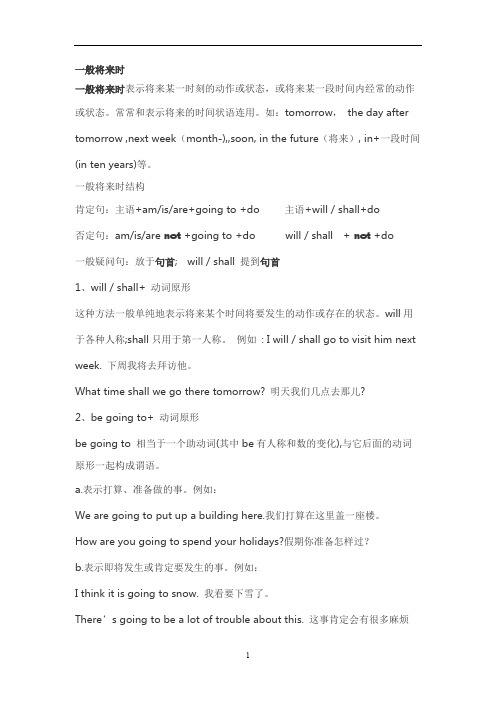
一般将来时一般将来时表示将来某一时刻的动作或状态,或将来某一段时间内经常的动作或状态。
常常和表示将来的时间状语连用。
如:tomorrow,the day after tomorrow ,next week(month-),,soon, in the future(将来), in+一段时间(in ten years)等。
一般将来时结构肯定句:主语+am/is/are+going to +do 主语+will / shall+do否定句:am/is/are not +going to +do will / shall + not +do一般疑问句:放于句首; will / shall 提到句首1、will / shall+ 动词原形这种方法一般单纯地表示将来某个时间将要发生的动作或存在的状态。
will用于各种人称;shall只用于第一人称。
例如: I will / shall go to visit him next week. 下周我将去拜访他。
What time shall we go there tomorrow? 明天我们几点去那儿?2、be going to+ 动词原形be going to 相当于一个助动词(其中be有人称和数的变化),与它后面的动词原形一起构成谓语。
a.表示打算、准备做的事。
例如:We are going to put up a building here.我们打算在这里盖一座楼。
How are you going to spend your holidays?假期你准备怎样过?b.表示即将发生或肯定要发生的事。
例如:I think it is going to snow. 我看要下雪了。
There’s going to be a lot of trouble about this. 这事肯定会有很多麻烦一、选择填空:( ) 1. There __________ a meeting tomorrow afternoon.A. will be going toB. will going to beC. is going to beD. will go to be( ) 2. Charlie ________ here next month.A. isn’t workingB. doesn’t workingC. isn’t going to workingD. won’t work( ) 3. He ________ very busy this week, he ________ free next week.A. will be; isB. is; isC. will be; will beD. is; will be( ) 4. There ________ a dolphin show in the zoo tomorrow evening.A. wasB. is going to haveC. will haveD. is going to be( ) 5. –________ you ________ free tomorrow?– No. I ________ free the day after tomorrow.A. Are; going to; willB. Are; going to be; willC. Are; going to; will beD. Are; going to be; will be ( ) 6. Mother ________ me a nice present on my next birthday.A. will givesB. will giveC. givesD. give( ) 7. – Shall I buy a cup of tea for you?–________. (不,不要。
完整版)一般将来时基本用法
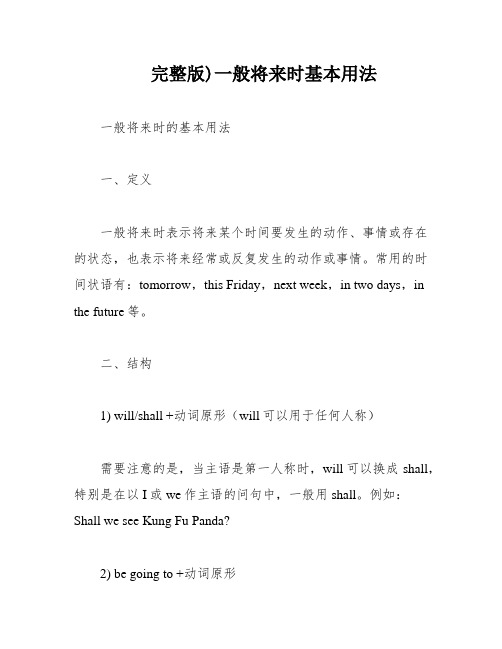
完整版)一般将来时基本用法一般将来时的基本用法一、定义一般将来时表示将来某个时间要发生的动作、事情或存在的状态,也表示将来经常或反复发生的动作或事情。
常用的时间状语有:tomorrow,this Friday,next week,in two days,in the future等。
二、结构1) will/shall +动词原形(will可以用于任何人称)需要注意的是,当主语是第一人称时,will可以换成shall,特别是在以I或we作主语的问句中,一般用shall。
例如:Shall we see Kung Fu Panda?2) be going to +动词原形例如:I’m going to play the piano。
be going to和will的区别be going to和will的用法虽然都表示将来发生动作或情况,一般情况下能互换。
但它们的用法是有区别的。
be going to主要用于:1、表示事先经过考虑、安排好打算、计划要做的事情。
例如:Dad and I are going to watch an opera this afternoon.2、表示根据目前某种迹象判断,某事非常有可能发生。
例如:Look。
There come the dark clouds。
It is going to rain.三、一般疑问句和否定句一般疑问句:1) will/shall +动词原形(will可以用于任何人称)——在will后加not2) be going to +动词原形——在be后加not例如:She will come back in three days.Will she not come back in three days?They are going to clean their classroom.Are they not going to clean their classroom?否定句:1) will/shall +动词原形(will可以用于任何人称)——将will提前2) be going to +动词原形——将be提前例如:She will come back in three days.She will not come back in three days.Will she come back in three days?XXX is whether they will actually do it。
【备战高考】英语一般将来时用法总结(完整)

【备战高考】英语一般将来时用法总结(完整)一、单项选择一般将来时1.— What do you want for breakfast, Mike?— I think I _______ some bread and milk.A.am going to have B.had C.will have D.am having【答案】C【解析】试题分析:句意:--迈克,你早饭想吃什么?--我想吃一些面包和牛奶。
因为是将来的事情,所以用一般将来时,will表示临时决定,符合句意,be going to计划,打算,be doing 即将做,都不符合句意。
所以选C。
考点:考查时态2.If their marketing plans succeed, they ________ their sales by 20 percent.A.will increase B.have been increasingC.have increased D.would be increasing【答案】A【解析】句意:要是他们的市场计划成功了,他们将增加20%的销售额。
从句是一般现在时表将来,主句常用一般将来时或情态动词can/may+动词原形。
3.---It ______ be only two days before I have the job interview.---______ you succeed.A.must; May B.must; Should C.will; May D.will; Should【答案】C【解析】试题分析:考查倒装句和时态。
第一空考查了固定句式中的时态。
固定句式:it be 一段时间 before从句;当Before引导的时间状语从句中使用一般现在时的时候,前面的主句使用将来时。
第二空使用倒装句的形式may you succeed祝你成功。
考点:考查倒装句和时态点评:固定句式:it be 一段时间 before从句;当Before引导的时间状语从句中使用一般现在时的时候,前面的主句使用将来时。
一般将来时用法
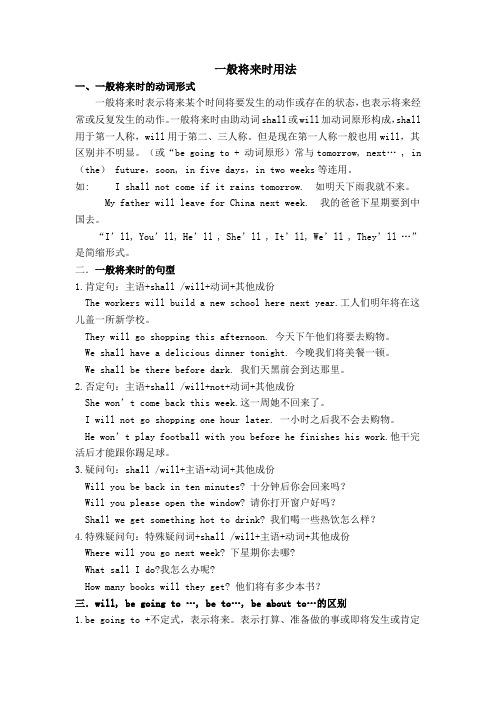
一般将来时用法一、一般将来时的动词形式一般将来时表示将来某个时间将要发生的动作或存在的状态,也表示将来经常或反复发生的动作。
一般将来时由助动词shall或will加动词原形构成,shall 用于第一人称,will用于第二、三人称。
但是现在第一人称一般也用will,其区别并不明显。
(或“be going to + 动词原形)常与tomorrow, next… , in (the) future,soon, in five days,in two weeks等连用。
如: I shall not come if it rains tomorrow. 如明天下雨我就不来。
My father will leave for China next week. 我的爸爸下星期要到中国去。
“I’ll, You’ll, He’ll , She’ll , It’ll, We’ll , They’ll …”是简缩形式。
二.一般将来时的句型1.肯定句:主语+shall /will+动词+其他成份The workers will build a new school here next year.工人们明年将在这儿盖一所新学校。
They will go shopping this afternoon. 今天下午他们将要去购物。
We shall have a delicious dinner tonight. 今晚我们将美餐一顿。
We shall be there before dark. 我们天黑前会到达那里。
2.否定句:主语+shall /will+not+动词+其他成份She won’t come back this week.这一周她不回来了。
I will not go shopping one hour later. 一小时之后我不会去购物。
He won’t play football with you before he finishes his work.他干完活后才能跟你踢足球。
英语动词时态用法归纳:一般将来时

英语动词时态用法归纳:一般将来时一、一般将来时的构成一般将来时的由s hall / will+ 动词原形构成。
二、一般将来时的基本用法(1) 表示单纯的将要发生的动作或情况。
常与表示将来的时间状语连用。
如:Tomorrow will be Sunday. 明天是星期天。
They say that it will rain. 他们说要下雨。
I’ll be thirty-seven on my next birthday. 到下次生日,我就三十七岁了。
We won’t be free tonight. 今晚我们没空。
(2) 也可以表示临时决定要做的事。
如:—I thought I asked you to sweep the floor.—O h, I’m sorry. Mother, I will do it right now.—我原以为我让你扫地了。
—噢,对不起,妈妈,我就做。
—You have left the door open.—O h, so I have. I’ll go and lock it.—你忘了锁门。
—哦,是的。
我就去。
(3) 有时虽没有时间状语,但从意思上可以判断指将来的动作。
如:Who will take the chair? 谁当主席?You will pass the examination. 你会通过那个考试的。
The meeting won’t last long. 会开不了多久。
(4) 一般将来时有时还表示倾向和习惯性。
如:Oil will float on water. 油总浮在水面上。
Fish will die without water。
鱼离开水就会死掉。
The machine won't work because of a faulty connection. 机器电源线接错了,所以开不动。
三、表示将来时的几种方法(1) be going to+动词原形。
一般将来时的用法与基本句型

一般将来时的用法与基本句型一般将来时表示将来某一时刻的动作或状态,或将来某一段时间内经常性的动作或状态,那么你知道如何去使用呢?以下是由店铺整理关于一般将来时的用法的内容,希望大家喜欢!一般将来时的用法一、一般将来时的定义用于表示将来某一时刻的动作或状态,或将来某一段时间内经常的动作或状态。
常常和表示将来的时间状语连用,如:tomorrow, next week, in the future等。
(will常简略为'll,并与主语连写在一起,如:I'll, she'll, he'll, it'll, we'll, you'll, they'll)二、一般将来时的构成1. will/shall+动词原形”Iwill/shall go to visit him next week.下周我将去拜访他。
2. be going to+动词原形Thereis going to be a football match this afternoon.今天下午将有一场足球比赛。
Iam going to go to the park.我将要去公园。
三、一般将来时的应用1. 肯定句主语+will+动词原形+其他,如:Theywill have a test next time.下次他们将有一次测试。
He will get married.他就快结婚了。
主语+will not +动词原形+其他,如:Shewill not be an engineer.她不会成为一位工程师。
3. 一般疑问句Will+主语+动词原形+其他+?,回答时使用yes/no. 如:Willhe live in New York in 10 years?他会在纽约住10年吗?Yes,he will.是的,他会。
4. 特殊疑问句特殊疑问词+will+主语+动词原形+其他+?.如:Why will you be here on Sunday?周日你为什么会在这儿?I will have a meeting on Sunday.我将要在周日举行一个聚会。
英语一般将来时的用法

英语一般将来时的用法英语一般将来时(Simple Future Tense)表示将要发生的动作或状态。
它通常用于描述在未来某个时间会发生的事件、计划、安排或预测。
以下是一般将来时的用法:1. 使用助动词will + 动词原形:这是构成一般将来时的基本结构。
例如:- I will go to the gym tomorrow.(我明天会去健身房。
)- They will visit their grandparents next week.(他们下周会去看望他们的祖父母。
)2. 在口语中,will有时可以缩写为'll,特别是在美国英语中。
例如:- She'll call me later tonight.(她今晚晚些时候会给我打电话。
)- We'll have a party for his birthday.(我们会为他的生日举办一个派对。
)3. 在疑问句和否定句中,将will提前到主语之前。
例如:- Will you come to the meeting tomorrow?(你明天会来参加会议吗?)- They will not be able to attend the concert.(他们不能参加音乐会。
)4. 表示习惯性动作的未来时,可以使用be going to + 动词原形。
例如:- He is going to play basketball after work every day.(他每天下班后都会打篮球。
)- She is going to study abroad next year.(她明年打算出国留学。
)5. 表示按计划或安排将要发生的事情,可以使用现在进行时。
例如:- The train is leaving at 6 pm.(火车将在下午6点离开。
)- The concert starts in an hour.(音乐会一小时后开始。
)6. 表示预测或推测未来可能发生的情况,可以使用情态动词may, might, could, should, must等。
一般将来时的用法
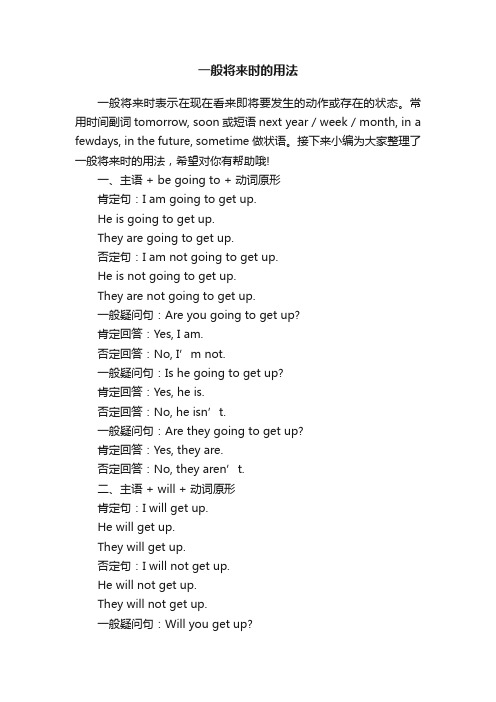
一般将来时的用法一般将来时表示在现在看来即将要发生的动作或存在的状态。
常用时间副词tomorrow, soon或短语next year / week / month, in a fewdays, in the future, sometime 做状语。
接下来小编为大家整理了一般将来时的用法,希望对你有帮助哦!一、主语 + be going to + 动词原形肯定句:I am going to get up.He is going to get up.They are going to get up.否定句:I am not going to get up.He is not going to get up.They are not going to get up.一般疑问句:Are you going to get up?肯定回答:Yes, I am.否定回答:No, I’m not.一般疑问句:Is he going to get up?肯定回答:Yes, he is.否定回答:No, he isn’t.一般疑问句:Are they going to get up?肯定回答:Yes, they are.否定回答:No, they aren’t.二、主语 + will + 动词原形肯定句:I will get up.He will get up.They will get up.否定句:I will not get up.He will not get up.They will not get up.一般疑问句:Will you get up?肯定回答:Yes, I will.否定回答:No, I won’t.一般疑问句:Will he get up.肯定回答:Yes, he will.否定回答:No, he won’t.一般疑问句:Are they going to get up?肯定回答:Yes, they are.否定回答:No, they aren’t.一般将来时/式(The Simple Future tense)时态定义be going to表主观的打算shall和will常常缩写成'll ,紧接在主语之后。
一般将来时的用法及常见句型总结

一般将来时的用法及常见句型总结一般将来时是英语中用来表示将来发生的动作或状态的一种时态。
在句子中,一般将来时通常与表示将来的时间状语词搭配使用,如tomorrow(明天)、next week(下周)、in the future(将来)等。
同时,一般将来时也可以使用助动词will或shall来构成。
下面将介绍一般将来时的用法及常见句型。
1. 一般将来时的肯定句结构:主语 + will/shall + 动词原形 + 其他成分例如:- I will go to the park tomorrow.(我明天将去公园。
)- They will watch a movie tonight.(他们今晚将要看电影。
)2. 一般将来时的否定句结构:主语 + will/shall + not + 动词原形 + 其他成分例如:- She will not join the party.(她不会参加派对。
)- We shall not travel to Europe.(我们不会去欧洲旅行。
)3. 一般将来时的疑问句结构:Will/Shall + 主语 + 动词原形 + 其他成分?- Will you come to the concert?(你会来听音乐会吗?)- Shall we visit the museum tomorrow?(我们明天要参观博物馆吗?)4. 一般将来时的特殊用法:a. 表示计划或安排例如:- We will have a meeting next Monday.(我们下周一要开会。
)- They will go on a vacation in August.(他们八月份将去度假。
)b. 表示意愿或意图例如:- He will help you with your homework.(他愿意帮你做作业。
)- She shall buy a new car soon.(她打算很快买辆新车。
)c. 表示预测或推断例如:- It will rain tomorrow.(明天会下雨。
一般将来时用法小结

一般将来时用法小结一般将来时用法小结:一般将来时表示在将来某个时间要发生的动作或存在的状态。
一 . 一般将来时的构成:1. 由助动词“shall/ will +动词原形”构成,shall 用于第一人称,will 用于第二、第三人称,2. 一般将来时的否定和疑问形式:一般将来时的否定形式是will not ,缩写为won't; shall not ,缩写为shan't 。
一般将来时的疑问形式是把will/ shall 提到主语前。
如:He won’t go to the park this Sunday. 本周日他不去公园。
Will you go swimming with me? 和我一起去游泳好吗?二 . 一般将来时的基本用法:1.表示“纯粹的将来”:①表示将要发生的动作或情况,常带有表示将来的时间状语,如tomorrow, next week, in two days, from now on 等。
如:It will be fine tomorrow.明天天气晴朗。
②表示预料将要发生的动作或情况。
如:You will feel better after having this medicine. 吃了这药,你就会感觉好些的。
③表示由于习惯倾向而会经常发生的动作,本用法中的will 要重读。
如:Boys will be boys. [谚语]男孩毕竟是男孩。
2. 表示“带有情态意义的将来”,用来表示意图,用will 来表示。
如:I will be more careful next time. 下次我要更加小心。
I won't go shopping this afternoon, but she will. 今天下午我不想去购物,但她想去。
will 在疑问句中,用来表示有礼貌地征询对方的意见。
如:Will you have some more tea? 要不要再喝点茶?What shall we do this weekend? 本周末我们要干什么?三 . 一般将来时的其它几种表示法:1. 用be going to 表示be going to相当于一个助动词,与其后的动词原形一起构成句子的谓语,表time )(当时), last +时间(如last week, month, year, Monday, …January, …spring, …, etc. ), that +时间(如that day, afternoon, summer, …, etc. ), 时间+ ago(如a few minutes ago, two weeks ago , years ago, …etc.)二、一般过去时的主要语法功能:1. 表示过去发生的动作或情况, 过去时间可以由状语或上下文表示出来:?e.g. He returned home very late last night. 他昨晚很晚回家。
一般将来时的用法
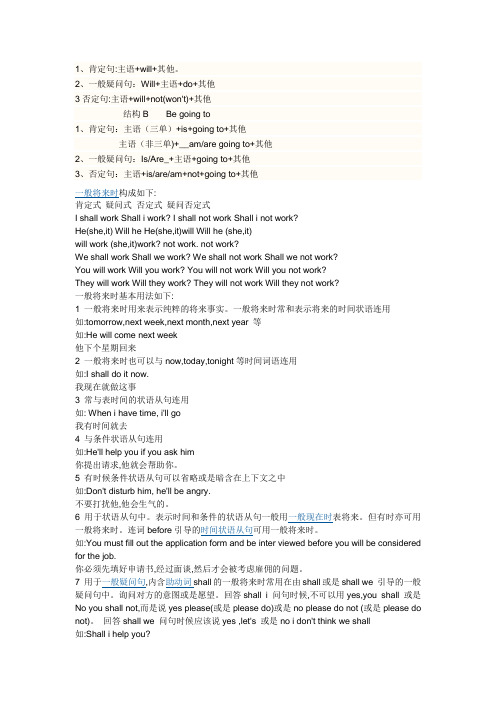
1、肯定句:主语+will+其他。
2、一般疑问句:Will+主语+do+其他3否定句:主语+will+not(won't)+其他结构B Be going to1、肯定句:主语(三单)+is+going to+其他主语(非三单)+__am/are going to+其他2、一般疑问句:Is/Are_+主语+going to+其他3、否定句:主语+is/are/am+not+going to+其他一般将来时构成如下:肯定式疑问式否定式疑问否定式I shall work Shall i work? I shall not work Shall i not work?He(she,it) Will he He(she,it)will Will he (she,it)will work (she,it)work? not work. not work?We shall work Shall we work? We shall not work Shall we not work?You will work Will you work? You will not work Will you not work?They will work Will they work? They will not work Will they not work?一般将来时基本用法如下:1 一般将来时用来表示纯粹的将来事实。
一般将来时常和表示将来的时间状语连用如:tomorrow,next week,next month,next year 等如:He will come next week他下个星期回来2 一般将来时也可以与now,today,tonight等时间词语连用如:I shall do it now.我现在就做这事3 常与表时间的状语从句连用如: When i have time, i'll go我有时间就去4 与条件状语从句连用如:He'll help you if you ask him你提出请求,他就会帮助你。
一般将来时的定义结构例句用法
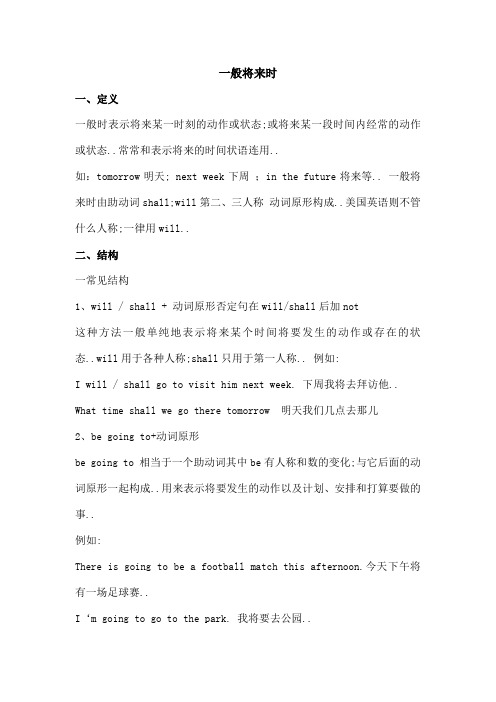
一般将来时一、定义一般时表示将来某一时刻的动作或状态;或将来某一段时间内经常的动作或状态..常常和表示将来的时间状语连用..如:tomorrow明天; next week下周;in the future将来等.. 一般将来时由助动词shall;will第二、三人称动词原形构成..美国英语则不管什么人称;一律用will..二、结构一常见结构1、will / shall + 动词原形否定句在will/shall后加not这种方法一般单纯地表示将来某个时间将要发生的动作或存在的状态..will用于各种人称;shall只用于第一人称.. 例如:I will / shall go to visit him next week. 下周我将去拜访他.. What time shall we go there tomorrow 明天我们几点去那儿2、be going to+动词原形be going to 相当于一个助动词其中be有人称和数的变化;与它后面的动词原形一起构成..用来表示将要发生的动作以及计划、安排和打算要做的事..例如:There is going to be a football match this afternoon.今天下午将有一场足球赛..I‘m going to go to the park. 我将要去公园..二常用结构1、用于"I expect; I'm sure; I think; I wonder等的"中..Don't worry about the exam. I'm sure you'll pass.不要担心这次考试;我确信你会通过的..2、用于和陈述句中..Work hard and you will succeed.如果你努力;就会成功的..3、与表示时间或条件的连用..I'll let you know as soon as he arrives.他一到我就通知你..三、例句1He will get married. 他就快结婚了12She will have a daughter.她就会有个女儿了3The cat will have a master.猫要有主人了4The dog will have a house. 狗就要有窝了5Telephone me this evening. I‘ll be at home. 今晚给我打电话;我会在家..6I'llshall/willdo a better job next time. 下次我要干得好7The car won‘t start.车开不了啦..8Oil and water will not mix. 油水没法混在一起..四、用法一一般将来时表示将要发生的动作或情况..例如:I willshall arrive tomorrow.我明天到..主语是第一人称时最好用shallWill you be free tonight 你今晚有空吗We won’t shan’t be busy this evening. 我们今晚不忙..二在一般将来时的句子中;有时有表示将来时间的;有时没有;这时要从意思上判断是否指未来的动作或情况..例如:Will she come 她会来吗三在以第一人称I或we作主语的问句中;一般使用助动词shall;这时或是征求对方的意见;或是询问一个情况b:a. Where shall we meet 我们在哪儿碰头b. Shall we have any classes tomorrow 明天我们有课吗在这类问句中;近几年来也有不少人用will;特别是在..例如:How will I get there 我怎么去四be going to+a.表示计划、打算、准备做的事..例如:We are going to put up a building here.我们打算在这里盖一座楼..How are you going to spend your holidays 假期你准备怎样过b.表示即将发生或肯定要发生的事..例如:I think it is going to snow. 我看要下雪了..五其他用法表示将来某一时刻的动作或状态;其表达形式除了“shall第一人称;will第二、三人称+动词原形构成”外;还有以下几种形式..1、“be going to+动词原形”表示即将发生的或打算进行的事..例如:①It is going to rain. 要下雨了..②We are going to have a meeting today. 今天我们开会..2、go; come;start;move;sail;leave;arrive;stay;live; fly;等可用进行表示按计划即将发生的动作行进式动词..例如:I'm leaving for Beijing.3、“be to+动词原形”表示按计划要发生的事或征求对方意见..例如:①Are we to go on with this work 我们继续干吗②The boy is to go to school tomorrow.这个男孩明天要去上学..4、“be about to+动词原形”表示即将发生的动作;意为:立刻;马上..后面一般不跟时间状语..例如:We are about to leave.我们马上就走..5、某些词;如come; go; leave; arrive; start; get; stay ;live; fly 等的也可表示将来..①The meeting starts at five o'clock.会议五点开始..②He gets off at the next stop.他下一站下车..6、“be due to"构成的谓语;意味“定于…”也可表示将来时此外:will与be going to 的分别be going to与will两者都可表示将要发生的事、将要去做某事;但它们有如下几点区别:1. be going to 表示将要发生的事情;will 表示的时间则较远一些;如:He is going to write a letter tonight.He will write a book one day.2. be going to 表示根据主观判断将来肯定发生的事情;will表示客观上将来势必发生的事情..He is seriously ill. He is going to die.He will be twenty years old.3. be going to 含有“计划;准备”的意思;而 will 则没有这个意思;如:She is going to lend us her book.He will be here in half an hour.4.在有条件的主句中;一般不用 be going to; 而多用will; 如:If any beasts comes at you; I'll stay with you and help you注意be going to和will在含义和用法上稍有不同..be going to往往表示事先经过考虑的打算;will多表示意愿;决心..两者有时不能互换..如:She is studying hard and is going to try for the exams.她正努力学习并尝试参加考试..is going to不能用will替换主将从现主将从现是指在和和中;如果是一般将来时;用一般现在时替代一般将来时..“主将从现”常见的有以下四种情况:一、时间的主句是一般将来时;那么从句常常用一般现在时..如: When I grow up; I’ll be a nurse and look after patients.我长大后要当一名护士;照顾病人..二、如果主句是祈使句;那么从句通常要用一般现在时如:Don’t laugh at me when I make a mistake.我犯错误的时候不要笑话我..三、如果主句是含有情态动词的一般现在时;根据需要从句多用一般现在时如:You should be quiet when you are in the reading room在阅览室时应保持安静..四、如果if的条件状语从句遇到变换间接和直接时 ; 祈使句应用not to....如; She said not to close the window常见的时间状语从句的连词有:as soon as;when;while ;as;until等主将从现说的是在含有时间状语从句和条件状语从句的主从复合句中;如果主句的时态是一般将来时;那么从句要用一般现在时..例如:I will tell him about it when he comes.If it is fine tomorrow; we will go outing.如果主句的时态是过去将来时;那么从句要用一般过去时..例如:He said that he would have another try if he had the chance.I knew he could help me if he was free the next day.主要标志有:if 、unless 、until、 when 、as soon as。
- 1、下载文档前请自行甄别文档内容的完整性,平台不提供额外的编辑、内容补充、找答案等附加服务。
- 2、"仅部分预览"的文档,不可在线预览部分如存在完整性等问题,可反馈申请退款(可完整预览的文档不适用该条件!)。
- 3、如文档侵犯您的权益,请联系客服反馈,我们会尽快为您处理(人工客服工作时间:9:00-18:30)。
一般将来时1.一般将来时:表示将来要发生的动作或存在的状态。
2.一般将来时的助动词:will, shall(只用于主语是第一人称时), am going to, is going to, are going to3.一般将来时的谓语结构:will+V,shall+V,am going to+V,is going to+V,are going to+V (V表示动词原形)4.一般将来时的主语与谓语结构:肯定句一般疑问句否定句1) 主语+will+V Will+主语+V 主语+won’t+V (will not=won’t)2) I/We+shall+V Shall+I/We+V I/We+shan’t+V (shall not=shan’t)3) I+am going to+V Am+I+going to+V I+am not going to+V4) 主语(第三人称单数)+is going to+V Is+主语(第三人称单数)+going to+V 主语(第三人称单数)+isn’t going to +V5) 主语(复数人称)+are going to+V Are+主语(复数人称)+going to+V 主语(复数人称)+aren’t going to+V5.There be句型的一般将来时结构:肯定句一般疑问句否定句1) There will be…Will there be…There won’t be…2) There is going to be…Is there going to be…There isn’t going to be…3) There are going to be…Are there going to be…There aren’t going to be…6.句子中有下列结构时,句子用一般将来时:1) 句子中有tomorrow或tomorrow构成的时间短语:tomorrow, tomorrow morning, tomorrow afternoon, tomorrow evening, the day after tomorrow 例:They will have a party the day after tomorrow.=They are going to have a party the day after tomorrow.There is going to be a baseball match tomorrow afternoon.2) 句子中有“next+时间名称”的短语时:next week, next day, next year, next month, next spring, next term, next weekend,next morning…….(注意:句子中如果有“the next+时间名称”的短语,句子通常用一般过去时。
)例:They will have a picnic next weekend.=They are going to have a picnic next weekend.3) 句子中有“in+将来的年份”的短语时。
例:He will be twenty years old in 2021.=He is going to be twenty years old in 2021.4) 句子中有“in+时间量”的短语时。
例:They will finish the hard work in half an hour.=They are going to finish the hard work in half an hour. 5) 句子中有soon时,而且句子中或上下文中没有表示过去时间。
例:The boss will be back soon.=The boss is going to be back soon.6) 句子中in (the) future的短语时,句子用一般将来时。
例:I won’t be a teacher in the future.7.特殊句型:1) Shall I do sth?的句子通常是用来表示征求对方意见,希望获得对方的许可,与May I do sth?的作用相似。
例:—Shall I open the window? —Do please. (—我把窗子打开行吗?—你尽管开吧。
)2) Shall we do sth?的句子通常用来表示提出建议,且提建议的本人也将参与。
例:—Shall we go by plane? —Good idea.. (—我们乘飞机去怎么样?—好主意。
)3) 一些来往动词(或称为“位移动词”)只要用现在进行时就可以表示将来的动作。
常见的来往动词有:go, come, move, leave, fly(乘飞机去), travel, arrive(到达), run等例:They are coming to see us tomorrow.=They will come to see us tomorrow.Mr. Smith is flying to :London next Monday.=Mr. Smith will fly to London next Monday.We are going to the gym tomorrow afternoon.=We will go to the gym tomorrow afternoon.【练习】I. 根据要求改变下列句型,每空一词。
1) They are going to stay at home tomorrow. (改为一般疑问句)________ _________ ________to ___________at home tomorrow?2) She will help us. (改为否定句)She _________ ___________us.3) The girls are going to sing in the classroom after school. (对划线部分提问)_______ ________the girls _______ ________ ________in the classroom after school?4) The young people are going to have a party next Saturday. (对划线部分提问)_______ _________the young people _______ ________ _________next Saturday?5) I am going to do my homework at home this evening. (对划线部分提问)________ ________you _______ _______ ________at home this evening?6) They are going to draw pictures near the river this Sunday morning. (对划线部分提问)________ _______they ________ ________ _________pictures this Sunday morning?7) The children are going to play volleyball on the school playground this afternoon. (对划线部分提问) _______ _______the children ________ ________ ________volleyball this afternoon?8) The students in Class One are going to work on the farm next week. (对划线部分提问)_______ ________the students in Class One ________ _______ _______on the farm?9) The Young Pioneers are going to plant(种植) trees on the hill on March 12th. (对划线部分提问)________ ________the Young Pioneers ________ _________ ________trees on the hill?10) They will go to see the doctor by bus. (对划线部分提问)_________ ________they _________ _________ _________the doctor?11) They are going to stay in Shanghai for two months. (对划线部分提问)________ ________ ________they ________ _________ _________in Shanghai?12) The Young Pioneers will help the old man tomorrow. (对划线部分提问)_________ ________the Young Pioneers ________tomorrow?13) The little girl is going to run after her brother. (对划线部分提问)_________ _______ _________ _________ _________after her brother?II. 用be going to的结构翻译下列句子1) 他的叔叔明天要来看望他们。
2) 我们所有的人下星期都要去农场干活。
3) 那些小伙子们明天要到河里去游泳。
4) 我明天早上要五点起床。
5) 他的弟弟下星期不在家。
III. 用will的结构翻译下列句子1) 我们明天早上不上英语课。
2) 你打算和我们一起打牌(play cards)吗?3) 那些年轻人下星期六要到山上去种树(plant trees)吗?4) 那位医生明年要到农村去工作吗?5) 我今天晚上不打算在家看电视了。
6) 我的祖父明天不去看医生了。
IV. 用来往动词翻译下列句子(每句两种说法)1) 她今天下午要去超市购物。
2) Jim明天要去滑冰。
3) 他要离开中国了。
4) Mr. Green打算后天来这里。
5) 你们打算什么时候去上海?6) 他的学生们打算什么时候去滑雪?7) 你们打算去哪里?V. 用所给动词的正确时态完成下列句子。
